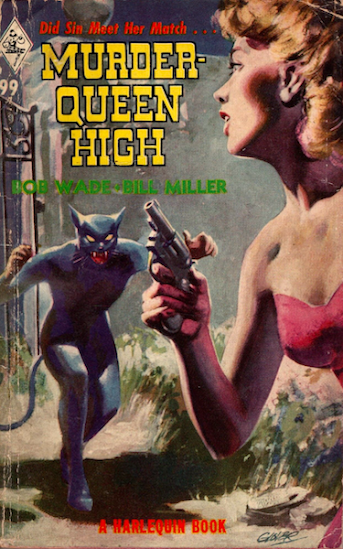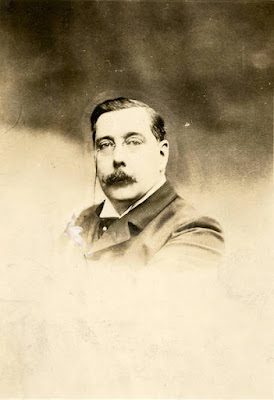Archibald Lampman's 'In November'
'November the First' by the Master of All Poets
A JOURNEY THROUGH CANADA'S FORGOTTEN, NEGLECTED AND SUPPRESSED WRITING
 |
| Murder — Queen High Bob Wade and Bill Miller Toronto: Harlequin, 1951 |
Over the years, the Dusty Bookcase has shared some very frightening covers from Harlequin's early history. Who can forget The Corpse Came Back, the 2014 Harlequin Halloween selection.
Apologies.
Murder — Queen High rates lower on the terror-inducing index, though I think you'll agree that it's pretty scary. A feline/human form threatens a gun-packing woman in a pink frock. What exactly is going on here?
The back cover only raises more questions:
Is the woman in pink the Queen? Is she Fay Jordan, "she of the sensuous figure and the mind to match"? Could it be "the curvy, swervy girl called Sin"? Whatever the answer, Murder — Queen High may just be the craziest novel Harlequin has ever published.
 |
| William Benjamin Basil King 26 February 1859, Charlottetown, Prince Edward Island - 22 June 1928, Cambridge, Massachusetts RIP |
 |
| The novel's epigraphs. |
No surprise that I'm a devotee of Lost Ladies of Lit, "the podcast dedicated to dusting off books by forgotten women writers." For over two years, hosts Kim Askew and Amy Helmes have covered works by writers I thought I knew (Edna Ferber, Ouida), writers I knew only as names (G.E. Trevelyan Gene Stratton-Porter), and others who were wholly unfamiliar (Kay Dick, Hilma Wolitzer). Always informative, I've looked forward to each new episode.
And so, I was honoured when Kim and Amy invited me to talk about a Canadian lost lady.
Who to choose?
Why, May Agnes Fleming, of course! Our first bestselling novelist, no Canadian writer is so forgotten. With Halloween approaching, I settled on her 1863 gothic novel The Midnight Queen for dusting off.
And then I came down with Covid... Appropriate, really, as Fleming's novel takes place during the Great Plague of London. "Cries and lamentations echoed from
one end of the city to the other," writes Fleming, "and Death and Charles
reigned over London together."
Recorded on an early day in the reign of Charles III, things weren't nearly so tragic when we sat down to speak, though you can hear that the virus still has a hold on my voice.
The podcast episode was posted today:
Whispering City
Horace Brown
Pickering, ON: Global Publishing, 1947
190 pages
Whispering City may be Canada's very first film noir. This 75-year-old paperback may be the very first novelization of a Canadian film. The heroine of both is Mary Roberts, a young crime reporter with Quebec City newspaper l'Information. Mary is preparing to leave work one day when she receives a call that a woman has been hit by a truck. The accident victim, faded vidette Renée Brancourt, was once a big deal in Quebec until her lover, Robert Marchand, plunged over Montmorency Falls. The struggle to accept his death led Renée to be institutionalized. In recent years, she'd been living in a squalid flat on rue Sous-le-Cap in Quebec's Lower Town.
 |
| La rue Sous-le-Cap. Quebec City, 1947 |
Renée has held firm to her belief that Robert's death was no accident. She tells Mary as much from her Hôtel-Dieu hospital bed, pointing an accusing finger at Albert Frédéric.
Surely not! The man is not only the most respected lawyer in Quebec, he's a patron of the arts!
Frédéric is currently supporting talented Michel Lacoste, whose Quebec Concerto will soon be making its debut at the Palais Montcalm. Unfortunately, the composer's work on final revisions s stymied by Blanche, his shrew of a wife. Just you try working on your concerto with big band music blaring in the background. Can't be done.
Michel breaks her 78. She slaps him. He storms out, ties one on, and shows up in the wee hours at Frédéric's palatial home. It isn't long before Michel passes out. When he does, Frédéric dons the composer's overcoat and sneaks off to the Lacoste flat. His intent is to murder Blanche, just as he had Robert Marchand all those years earlier, but he arrives to find she's committed suicide. A note is pinned to her pillow, which Frédéric quickly pockets.
The following morning, Frédéric convinces a hungover and confused Michel that he killed his wife in a fit of rage. The lawyer then offers the composer a deal: Frédéric will work to save Michel from the hangman if he kills Mary Roberts. The reporter's investigation of the old Marchand murder is getting too close to the truth.
The story and screenplay are straight out of Hollywood – Americans George Zuckerman and Michael Lennox wrote the former; Americans Rian James and Leonard Lee wrote the latter – but adapt well to Quebec City.
Brown sticks close to the script, though there are departures. He improves on the dialogue and wisely does away with the talkative sleigh driver who introduces the film. Brown gives Mary Roberts a backstory as an American who had begun her career writing for a New York tabloid. In one memorable scene not featured in the film, Mary and Frédéric discuss Canadian painters. If anything, Brown depicts the lawyer as a more sinister figure – clearly a psychopath – making the book all the more dark.
Whispering City is far from a great film – its current 6.2 rating on IMDb seems fair – though I must say it gets better with each viewing. See for yourself; the film is now in the public domain. Of the muddy prints available on YouTube, this appears to be the best:
I wouldn't be surprised that it gets better with each reading.
Dedication:
Paul L'Anglais was the producer of Whispering City and its French-language version La Forteresse.
Fun fact: In 1952, the film Whispering City was rereleased under the title Crime City. Seems a bit unfair to Quebec, especially when one considers that there's only one criminal.
The novel is preceded by an enthusiastic foreword by the author followed by a "CAMERA-QUIZZ" in which readers are challenged to place twelve stills from the film in the correct order.
Don't mean to brag, but I had no trouble.
Access: The University of Calgary has a copy.
Am I right that 'A New England Thanksgiving' ranks amongst Bliss Carman's better-known poems? Whatever the case, I'm pretty sure it's more familiar than 'A Thanksgiving.' This version is found in Last Songs from Vagabondia (Boston: Small, Maynard, 1900), Carman's final collaboration with American poet Richard Hovey. I quite like it.
The town is Bloomhill; the talk is of Elsbeth Payson. A few days before her eighteenth birthday, young Doctor Frederick Stowell catches Elsbeth at the Van der Water house. Priscilla Van der Water, a former "acrobatic dancer" now married to a brickyard foreman, is giving the girl a lesson on how to do a split. Stowell is horrified; Elsbeth lives in wealthy North Hill, and girls from North Hill do not visit Patchtown, Bloomhill's working class neighbourhood. The doctor orders her away, but she stands her ground: "Did you know, Freddie, that even for classical or professional ballroom dancing you should be able to do what's known as a 'split'?"
Elsbeth Payson's dream is to become a professional dancer. Her late mother approved, which is how she came to know Priscilla Van der Water in the first place. Her father, also late, looked to set his daughter off on a more conventional path, and so left almost everything to his two spinster sisters.
Almost everything.
On her birthday, Elsbeth is due to receive an inheritance of three thousand dollars (roughly $68,350 today). She intends to take the money, travel to New York, and study dance. A long-held plan, it comes off almost as Elsbeth had always envisioned, except that she's accompanied by pregnant Patchtowner Sadie Miller, whose fiancé was killed in one of Bloomhill's frequent industrial accidents.
Spanning 1933 and 1936, And the Town Talked is a Depression-era novel. I was interested in tensions between Bloomhill's classes, particularly after reading this early passage:
But And the Town Talked isn't much concerned with the plight of the proletariat. Though treated with sympathy, they're all pretty much the same: hard-working, cheerful, largely content with their lot in life. The exception is bad boy Cecil Andrews, who left Bloomhill's Patchtown for a life as a professional musician. He's a complex character, but only in relation to the others – Elspeth included.
Is And the Town Talked a masterpiece, as News Stand Library claims? Most certainly not!
Is Wild Geese a masterpiece, as academics have claimed? Here's hoping.
I'm moving my copy to the night table.
* Thanks to bowdler of Fly-by-Night, who spared me the task of comparing the McCall's and News Stand Library versions. His finding is that the latter cut short four of the novel's twenty-two chapters.
Object: A typical News Stand Library production, meaning that there is certain to be some sort of flaw. In this case, centre margins are so tight as to make it nearly impossible to read.
My copy was purchased earlier this year. Price: C$60.
The cover – uncredited – misleads in that Elsbeth has no child. Is she babysitting? Or is that meant to be minor character Sadie Miller?
"Not guilty, your honor!"
"I was dull, blank, all iron and ice; the judge, the jury, the public, even Kathleen, against me; and then that bottle in there — and I saw things like crystal! I had a glow in my brain, I had a tinge in my fingers; and I had success, and” — his face clouded — “he was as guilty as hell!”
Charley faces a dilemma:
What was there to do? Go back? Go back and knock at Kathleen’s door, another Enoch Arden, and say, "I have come to my own again”? Return and tell Tom Fairing to go his way and show his face no more? Break up this union, this marriage of love in which these two rejoiced? Summon Kathleen out of her illegal intercourse with the man who had been true to her all these years?
The story of a lost local literary gem, lost and foundMcGill-Queen's reissued Psyche the following year.
The author's three remaining books – Anything Could Happen! (1961), Undine (1964), and A Question of Judgement (1969) – have now been out of print for more than a half-century.
In a country plagued by indifference regarding its literary heritage, Phyllis Brett Young remains the most unjustly neglected writer.
 |
| Phyllis Brett Young 1914 - 1996 RIP |

